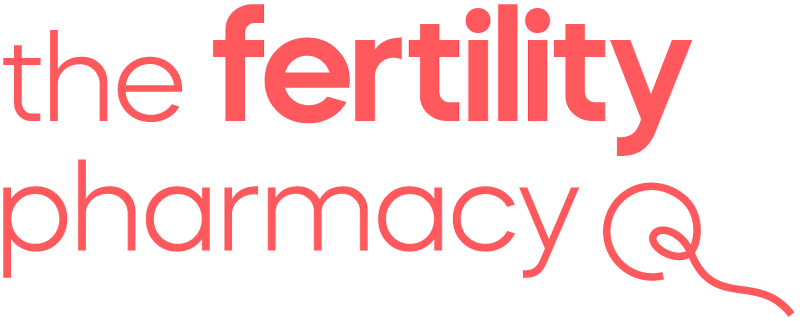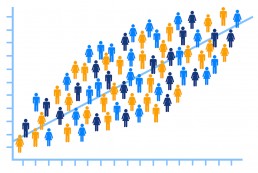Staying away from the stats
“How do you nurture a positive attitude when all the statistics say you’re a dead man? You go to work.”
– Patrick Swayze
“What do you think our chances are like?”
From talking to our clients, we know that this is usually one of the first questions they ask their IVF consultant at that all-important initial consultation.
When facing an uncertain and possibly difficult journey, we humans sometimes like to seek cold comfort in hard statistics so that we can prepare ourselves for what lies ahead.
Last year, one of our clients, Sarah, a 38-year-old with a thyroid condition came to us for her IVF protocol. Given her “advanced maternal age” (the NHS considers women over 35 to be in their later reproductive years) she’d been given just a 17 per cent chance of having a live birth on her first round of IVF.
That’s right – there was an 83 per cent chance of her first round NOT working – with odds like that, why even bother?
Unruffled by a somewhat dismal prognosis, she declared: “I’m just going to chuck the kitchen sink at it”.
“If I can make that 17 per cent into 18 or even 19, by making sure my body is in the best possible shape to undergo this treatment, then that’s what I’m going to do. Each little percent could be the difference between success and failure.”
Just 12 months later she gave birth to a perfectly healthy bouncing baby boy, weighing 7lbs 12oz.
She had been one of the 17 per cent.
We’re well aware that not all cases end this happily but Sarah’s story is a great example of how patients should not get bogged down by statistics, by averages, by data.
Humans are unique and though Sarah was aware of the odds, she also knew that despite a dodgy endocrine system, there were a lot of positives: she was 38, not 45; her ovarian reserve was about average for her age; she wasn’t overweight and her partner’s sperm was healthy. Heck, there were lots of reasons to feel optimistic!
So, what was Sarah’s “kitchen sink” three-month pre-treatment action plan?
- Cut out ALL alcohol (and nicotine – obviously). Go cold turkey. It’s for a relatively short period of time (unless – hopefully – you get pregnant and then it will another 40 weeks!) What better incentive is there than having your own baby?
- Review your diet and try to lose a few excess pounds – there is no need to be militant but the best foods for getting pregnant are the same as those for general well-being: whole grains, healthy fats and proteins. You could also try incorporating some fertility ‘superfoods’ into your diet such as asparagus (for folic acid), eggs (vitamin D), almonds (for antioxidants like vitamin E), oysters (bursting with zinc!), bananas (packed with hormone regulating vitamin B6) and chicken (protein is really important for egg production).
- Move more and get the blood flowing around your body and to your ovaries. Don’t be sedentary – aim for 10,000 steps if you can. If you can’t, make minor adjustments such as taking the stairs instead of the lift at work.
Promote egg quality by taking supplements. As a slightly older woman, this is something Sarah felt extremely passionately about because remember, you don’t need lots of eggs, you just need one good one! Coenzyme Q10 is a great place to start – CQ10 levels in the body decline with age but its function allows ovarian cells to produce energy. This in turn allows eggs to complete maturation without chromosomal errors, so by supplementing naturally present levels you stand a better chance of successful conception and pregnancy. - Investigate whether DHEA is right for you – this powerful hormone may help increase follicular stimulation and oestrogen production in women which, if you’ve been diagnosed with decreased ovarian reserve of premature ovarian failure, could help improve the quality of the eggs remaining. It shouldn’t be taken in high doses however and you must get clearance from your consultant before taking any supplements of this nature.
- Top up on Folic Acid – 400 micrograms should be taken in the run up to IVF and for the first 12 weeks of pregnancy to protect against neural tube defects (NTD), such as spina bifida, in babies.
- Seek out a qualified and regulated fertility acupuncturist – Sarah embarked on weekly sessions in the six weeks leading up to stims, had a session the day before egg collection and on the day of her embryo implantation. It isn’t cheap and the jury is out on whether it really will make a difference but it certainly won’t do any harm and anecdotal evidence over the years points to many a success story. Acupuncture can help to regulate hormone function, increase blood flow to the ovaries and uterus and perhaps the most important of all – help you to relax.
- Be kind to yourself. Remain realistic, but hopeful. Whatever coping mechanisms work for you, go with them. You might not want to tell anyone what you’re about to embark on and that’s fine. On the flipside, you might feel the need to tell everyone you meet – there are no rules.
So if you take away anything from this story, it is that:
You are not a statistic – statistics take in every single women within your age group and their varying medical backgrounds.
Whilst it might feel like the end result of your IVF treatment is out of your control, in actual fact, there’s a whole heap you can do to help increase its effectiveness. It’s all about the one percents.

